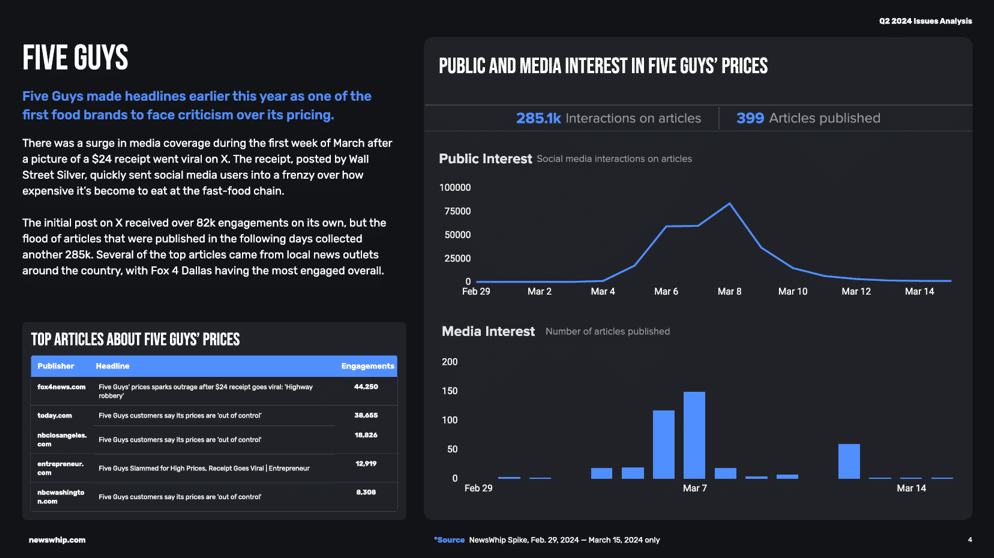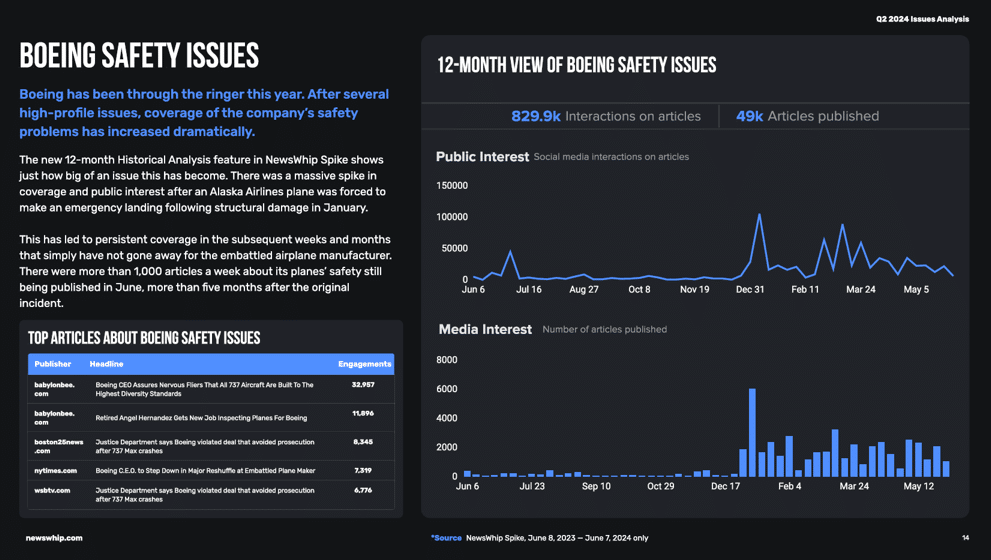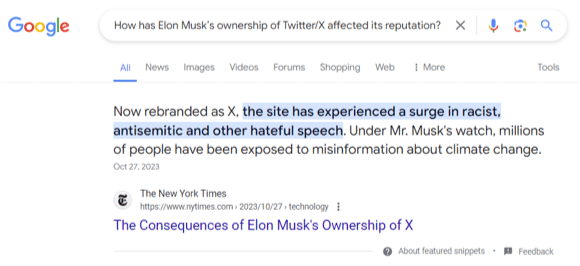
In 2024, brands are encountering a variety of challenges that can impact their reputation. Their decisions are under close scrutiny and require strategic foresight to effectively manage these issues.
Brand reputation issues in 2024
NewsWhip’s report, “The Biggest Reputation Issues Impacting Brands in 2024,” examines four specific types of crises that brands have faced in the first half of 2024:
- Food inflation. Rising food prices, while not unique to 2024, are drawing increasing public attention, especially regarding how major food brand executives address the issue. The report examines the top articles about Five Guys’ prices, Kellogg’s CEO, Chipotle’s portion sizes and In-N-Out prices.
- Artificial intelligence and cybersecurity breaches. Concerns about the future of artificial intelligence persist, coming from both the general public and industry insiders. The report analyzes the top articles about OpenAI and Scarlett Johansson, Microsoft’s vulnerability to hacks and the Netflix AI image controversy,
- Product-related reputational issues. Several brands have encountered reputation problems due to their products. The report evaluates articles about Target’s fluctuating stance on Pride merchandise, Boeing’s ongoing safety issues, Hertz selling its EV fleet and Nike’s England shirt controversy.
- Legal battles. Lawsuits have significantly impacted brands, particularly in the second quarter of this year. Just the presence of a lawsuit can harm a brand’s reputation. The report weighs articles about the DOJ’s Ticketmaster lawsuit, the Sheetz lawsuit and the Netflix Baby Reindeer lawsuit.
NewsWhip did an excellent job of measuring the relative size of the reputation issues facing each of these brands.
For example, 399 articles about Five Guys’ prices got 285,100 engagements from Feb. 29 to March 15, 2024.
If you look at the chart below, there was a spike in media coverage in early March after a picture of a $24 receipt went viral on X. The social media frenzy over how expensive to eat at the fast-food chain had died down by mid-March.

By comparison, 49,000 articles written about Boeing’s safety issues got 829,900 social media interactions from June 8, 2023, to June 7, 2024.
There was a massive spike in coverage and public interest after an Alaska Airlines plane was forced to make an emergency landing in January. However, 1,000 articles about Boeing safety issues were still published a week in June, more than five months after the original incident.

The NewsWhip report provided one tactical takeaway:
- “TikTok continues to be a major platform for brand criticism to spread and in many cases, like with Chipotle, it’s the principal driver of those conversations.”
Reputation management: Strategic insights and best practices
Crises are unpredictable, but they are not entirely unforeseen.
It’s estimated that 83% of public companies will face a crisis within the next five years that will significantly affect their share price, dropping it by 20-30%.
Brands and businesses must be prepared for a reputational crisis and armed with the best practices for critical incident response and crisis communications, including handling embarrassing social media posts.
Start by reading “State of Crisis Communication: Evidence and the Bleeding Edge,” by Dr. W. Timothy Coombs, University of Central Florida.
According to Dr. Coombs, crises generally fall into two categories:
- Operational crises: These disrupt organizational operations, such as fires, explosions or chemical releases. Initially, crisis management was designed to address these types of crises.
- Reputational crises: These damage an organization’s public image, often due to irresponsible management behavior or offensive corporate messages, leading stakeholders to view the organization unfavorably.
The main difference between the two is that operational crises pose a threat to public safety and stakeholder welfare, whereas reputational crises do not significantly impact these areas.
Research on crisis communication has highlighted three crucial lessons: the importance of timing, focusing on victims and combating misinformation.
Being the first to report a crisis can minimize damage. This concept, known as “stealing thunder,” is counterintuitive for many managers, who might prefer not to acknowledge a crisis.
However, information tends to leak, especially through social media, and multiple studies show that organizations benefit from disclosing crises early, as it reduces reputational damage and lessens the impact on consumer behavior.
Using social media is an effective way to steal the thunder. It allows organizations to report crises promptly, ensuring stakeholders hear about the crisis directly from the organization rather than through traditional media. This approach also allows for a more controlled and timely response.
When a crisis results in real victims, the response should be victim-centered, addressing their physical, financial and psychological needs. Crisis messages should emphasize the victims and how the organization is assisting them.
For instance, during the Costa Concordia crisis, Carnival Cruise Lines faced criticism for not adequately supporting victims. The perception of their response, whether accurate or not, shaped stakeholder views of the crisis.
Initial crisis statements should focus on public safety and welfare, providing details about the crisis and recommending actions to prevent harm. These statements should also include expressions of sympathy, offers of assistance and steps to prevent future crises.
An aggressive communication approach, actively engaging with stakeholders, is more effective than a passive one. Organizations that communicate frequently and through multiple channels recover their reputations and stock prices faster and more robustly.
Misinformation needs to be aggressively countered. In the digital age, false information spreads quickly and can be accepted as fact. Managers should swiftly debunk rumors, explaining the true situation with supporting evidence.
Consistent communication and transparency are crucial. Organizations should release crisis information on their online channels before it appears in traditional or digital media. This proactive approach ensures stakeholders get accurate information directly from the source, reducing the spread of misinformation.
In the realm of social media, embarrassing posts can quickly escalate into a crisis. Addressing such content involves evaluating its potential threat to the organization’s reputation and taking appropriate actions to mitigate damage.
Effective crisis communication strategies include being prepared for online reputation management, aggressively addressing negative content and replacing it with positive information.
Dig deeper: A 3-phased approach to proactive online reputation management
Crisis communication and SEO
Many industry observers think Google’s Panda update in February 2011 and Penguin update in April 2012 changed how online reputation management works, emphasizing high-quality content over spammy SEO techniques. But many shady SEOs think they’re smarter than Google’s automated systems and spam removal team.
That’s why Google is constantly evaluating and updating their systems to ensure that they are continuing to highlight relevant content.
In 2022, Google ran 894,660 search quality tests, conducted 148,038 side-by-side experiments and performed 13,280 live traffic experiments before launching 4,725 changes to how search works. That was more than a dozen a day.
Since then, Google has rolled out the October 2023 spam update, released the March 2024 spam update and unleashed the June 2024 spam update.
Corporate executives, brand managers and PR professionals need to recognize that clever spammy SEO tactics can’t “push” negative stories from credible sources down the search engine results page (SERP).
To effectively manage crises and protect an organization’s reputation, it’s essential to follow best practices in crisis communication, including timely reporting, victim-centered responses, aggressive misinformation countering and strategic use of social media.
Being prepared and proactive can significantly reduce the impact of crises on an organization’s operations and reputation.
If you need to convince your skeptical CEO of this stubborn fact, then ask them to Google, “How has Elon Musk’s ownership of Twitter/X affected its reputation?”
As the screenshot below illustrates, even one of the richest people in the world can’t “push” negative stories down.

Dig deeper: Online reputation management: Top 10 hurdles and how to overcome them
The latest strategic advice about the biggest reputation issues impacting brands
Let’s look at what several credible sources have to say about the biggest reputation issues impacting brands.
Start by reading “Do Actions Speak Louder Than Words?,” posted by Ryan Calsbeek, Ph.D., to the Institute for Public Relations (IPR) website on April 15.
Utilizing MAHA’s Darwin Intelligence platform, data was collected on 511 publicly traded companies across 16 global industries.
This included both public perception data (e.g., news and social media mentions) and corporate behavioral data (e.g., disclosed actions affecting stakeholders) across seven categories of corporate reputation: environmental impact, governance, employee treatment, community impact, diversity commitment, customer satisfaction and financial performance, including market cap and total sales.
- “This study underscores the need for corporations to embrace authenticity and action as foundational pillars of reputation management.”
- “In a world where so much information is available to the public, companies can no longer make commitments without follow-through.”
Next, read “Corporate Reputation in 2023,” published on IPR’s website on April 28, 2023, by USC Annenberg Center for Public Relations and Olivia K. Fajardo. Four online surveys revealed that:
- Public relations professionals identified “customer brand loyalty” as the most advantageous outcome of a strong company reputation.
- Nearly half (48%) of PR professionals believe that Gen Z will have the greatest influence on a company’s reputation in the next five years.
- 45% of PR professionals view ESG (Environmental, Social and Governance) as very important for building a reputation among consumers.
- An overwhelming 92% of investors consider a company’s ESG rating to be very or somewhat useful when deciding whether to buy its stock.
Then, read “Lessons Earned: Helping a High-Profile Brand Regain its Reputation,” which was posted to IPR’s website on June 23, 2020, by Kirk Stewart, who became global vice president of corporate communications for Nike in 1997.
He shared a dozen tips about how to rebuild a reputation at a time when Nike was the poster child for the anti-globalization movement:
- Understand your identity. When in doubt, align with the company’s mission as your guiding principle.
- Stay true to your values. Be clear about your principles and beliefs.
- Own your mistakes. Acknowledge your errors and remain humble.
- Prioritize meaningful actions over communication. Implement business improvements first, then integrate them into your communication strategy.
- Be accountable. Set performance metrics and share your progress publicly.
- Be transparent. Transparency enhances credibility.
- Engage with all stakeholders, including critics. This fosters mutual learning and humanizes your organization.
- Define yourself proactively. Shape your narrative before others do. Always be proactive.
- Inspire others. Inform, motivate and inspire your employees, your most crucial stakeholders.
- Stay connected with customers. Keep your brand relevant and remember the importance of selling your products and services.
- Let others advocate for you. Maintain a consistent message and be mindful of your tone and volume.
- Prepare for the unexpected. Anticipate unforeseen events and continuously monitor your reputation.
Finally, here’s what Katie Delahaye Paine, who I’ve known since 1986, told me via email about the biggest reputation issues impacting brands:
- “From my analysis of all the crises I analyzed for PR News, the biggest factor impacting reputation is the CEO. What they say in a crisis, what they do to cause a crisis, how they respond to a crisis.”
Although you may have as little influence over your CEO’s attitudes or overt behavior during a crisis as you do over Google’s ranking systems, there is an aspect of reputation management that you can informally influence in a desired way with relative frequency: Who is in charge of communications?
- Paine said, “ASPCA data showed that when PR was in charge of communications around the contaminated Chinese Pet food crisis, they actually made money, but during the Michael Vick dog fighting episode, legal was in charge and ASPCA couldn’t be quoted in any of the coverage and donations went down.”
If you’re a corporate executive, brand manager or SEO, then make the case for putting PR in charge.
source https://searchengineland.com/how-to-address-the-top-reputation-issues-impacting-brands-today-444204


0 Comments